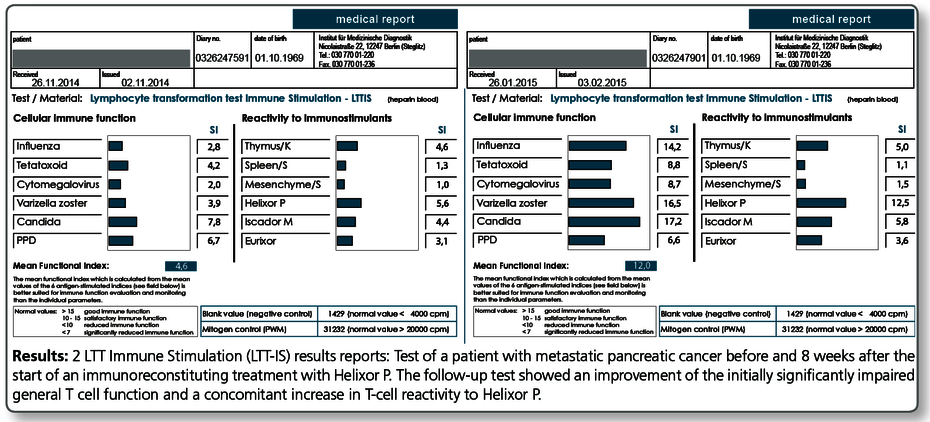LTT - Immune stimulation
Can the LTT also test the efficacy of immunostimulatory products?
CD4 helper and cytotoxic CD8 lymphocytes play a critical role in the defence against viruses and persisting intracellular bacteria and are also critical for tumour surveillance. Functional deficits of these cells can be both cause and consequence of chronic debilitating diseases.
The reconstitution of the immune system is a cornerstone of the treatment of lowered infection resistance and central to the support and aftercare with curative cancer treatments.
Today, the Biological Response Modifiers (BRMs) most commonly used in a medical practice environment are plant lectins (Echinacea, mistletoe products), bacterial lysates (e.g. Arthrokelan®, Gynatren®) and organo-peptides (thymus, spleen, mesenchyme).
For only a few of these substances used for immunostimulation the efficacy has been firmly established in placebo-controlled clinical trials. However, this situation is partly due to the fact that financing studies of this type is almost impossible for already approved products (no longer patentable).
It is often overlooked that critics have reported only very limited data demonstrating the lack efficacy of these treatments.
Insights from published case reports about BRMs and numerous studies investigating the mechanisms of action of the products show the following:
- An unspecific stimulation of lymphocytes by BRMs can be scientifically explained and measured in the lab.
- However, the proportion of patients in whom a treatment effect can be demonstrated amounts only to 30-60% and varies with regard to substance class and even with the respective product.
- Monotonous continuous administration of the same product does typically not achieve lasting immunostimulation as the immune system adapts.
- Continued immunostimulation after achieving optimum (for this patient) immune function can result in “flipping“ into immunosuppression. This “flipping“ can be best explained by an increase in regulatory CD4 and CD8 lymphocytes.
Our Institute was involved in a study investigating the bystander effect of a treatment with mistletoe products. If you are interested we will send you a full-text copy of the paper.
This study showed that a positive result, i.e. a stimulation index >3 in response to an immunostimulant, indicates the presence of T cell reactivity against antigen structures in this product.
Thus it is at least very likely that an immostimulant which tested positive in the LTT induces an immune response in the body with every application and consequently triggers a cytokine response.
The cytokines released in the process, especially IL-2 and IFN-γ, act as endogenous immunostimulants.
This mechanism of action is based on the so-called bystander mechanism and has been verified in the meantime for many products used therapeutically. Not only for mistletoe lectins, but also for products made of killed bacterial pathogens, organ preparations and plant-based immunostimulants with higher-molecular ingredients.
The LTT Immune Stimulation includes the LTT Immune Function (left side of the results report) and tests up to 6 additional products (free choice).
To obtain a list of the immune products available at the lab for in-vitro testing, call Tel.: +49 30 77001-220 or visit here.
| Please note: In contrast to this qualitative method, the cellular immune status which is based on a quantitative analysis of CD4, CD8 and NK cells is not a functional parameter and thus of only very limited use for monitoring immunostimulating treatments. This test can at best show long-term immunocompetence improvements. |
What patient sampling material is required for the LTT Immune Stimulation?
The LTT Immune Stimulation is almost identical with the LTT Immune Function. The only difference is the additional testing of immunostimulants. As this does not require extra blood, the LTT Immune Function can be performed with 20 mL heparin blood and 5 mL whole blood.
For the LTT Immune Stimulation, please note the products to be tested on the request form (you can choose up to 6 products).
We can provide you with a list of all products available at our laboratory. Other products have to be sent in together with the blood samples (Storage in the laboratory for follow-up testing can be arrange over the phone).

